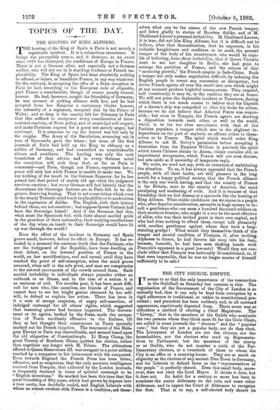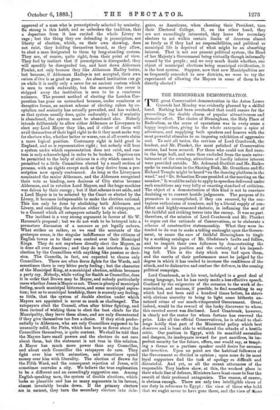THE CITY COUNCIL DISPUTE.
IT seems to us that the only importance of the commotion in the Guildhall on Saturday last consists in this. The organisation of the Government of the City of London is so radically bad, that it can only be kept from corruption by a rigid adherence to traditional, or rather to constitutional pre- cedent; and precedent has been suddenly and, to all outward appearance, capriciously departed from. There never was so ridiculous a method of electing a Chief Magistrate. The "Livery," that is, the members of the Guilds who nominate the two persons whom they think most fit for the Civic Chair, are called in some journals the " electors " and the "popular vote ;" but they are not a popular body, nor do they elect. The Liverymen of London are not the citizens, nor the householders, nor the electors who send up Representa- tives to Parliament, but the members of the ninety or so Guilds, who do not number a sixth of the Par- liamentary electors, or a twentieth of those to whom the City is an office or a counting-house. They are as much an oligarchy as the electors of any ancient Free Town in Germany, and for Liberals to defend them as the "representatives of the people" is perfectly absurd. Even this small body, more- over, does not elect the Lord Mayor. It thinks it does, but
it does not. Its habit for a century or more has been to nominate the senior Alderman on the rota, and some other Alderman, and to expect the Court of Aldermen to recognise the first. That is to say, a self-elected body shouts it
approval of a man who is prescriptively selected by seniority. So strong is this habit, and so unbroken the tradition, that a departure from it has excited the whole Livery to rage ; but the thing they are defending is prescription' not liberty of election which, on their own showing, does not exist, they holding themselves bound, as they allow, to elect a man designated to them by long-standing custom. They are, of course, quite right, from their point of view. They feel by instinct that if prescription is disregarded, they will speedily be disregarded too, and hoot down Alderman Fowler, not only because they like Alderman Hadley better, but because, if Alderman Hadley. is not accepted, their own raison d'etre is as good as gone. An absurd institution can go on while it is really only a cover for an ancient custom which is seen to work endurably, but the moment the cover is stripped away the institution is seen to be a cumbrous nuisance. The present method of electing the London Cor- poration has gone on untouched because, under cumbrous or deceptive forms, an ancient scheme of electing rulers by co- optation and seniority has actually prevailed, and has worked, as that system usually does, quite endurably ; but if seniority is abandoned, the system must be abandoned also. Nobody intends deliberately to allow either Aldermen or Liverymen to elect any Lord Mayor they like and if either of them will avail themselves of their legal right to do it they must make way for electors who, whether better or worse, can at all events claim a more logical position. Customary right is held good in England, and so is representative right ; but nobody will bear a system under which representation does not exist, and cus- tom is only acknowledged in order to be broken. Caprices can be permitted to the body of citizens in a city which cannot be permitted to a little Committee elected by a small section of persons, with no rights except such as they derive from a pre- scription now openly contemned. As long as the Liverymen nominated the senior Alderman, and the Aldermen recognised their vote as binding, men desirous of City status became Aldermen, and in rotation Lord Mayors, and the huge machine was driven by their energy ; but if that scheme is set aside, and a Lord Mayor is to be selected by the Court or elected by the Livery, it becomes indispensable to make the election rational. This an only be done by abolishing both Aldermen and Livery, and confiding the election either to all ratepayers, or to a Council which all ratepayers actually help to elect.
The incident is a very strong argument in favour of Sir W. Harcourt's proposal ; but we do not wish to be betrayed into a premature discussion of a measure as yet legally unborn. What strikes us rather, as we read the accounts of the grotesque scene, is the singular indifference of the citizens of English towns as to their own control over their Municipal Kings. They do not anywhere directly elect the Mayors, as is done all over America ; and they do not interfere in their election by the Councillors with anything like passion or deci- sion. The Councils, in fact, are expected to choose only Councillors. There are often fierce fights for the Wards, and sometimes there is very bitter party feeling ; but the character of the Municipal King, at a municipal election, seldom becomes a party cry. Nobody, while voting for Smith as Councillor, does
it in order that Brown may be Mayor, and nobody particularly cares whether Jones is Mayor or not. There is plenty of municipal feeling, much municipal bitterness, and some municipal aspira- tion; but as to municipal headship, there is scarcely any feeling, so little, that the system of double election under which Mayors are appointed is never so much as challenged. The ratepayers elect the Council, often after bitter fighting, and then instead of wishing them to elect the best chiefs for the Muncipality, they leave them alone, and are only discontented if they give themselves too free a choice. If they stick prefer- entially to Aldermen, who are only Councillors supposed to be unusually solid, the Plebs, which has been so fierce about the Councillors themselves, is quite content. We shall be told that the Mayors have small powers and the electors do not care about them, but the statement is not true in this relation.
A Mayor has much more power than any Councillor, and about each Councillor the ratepayers do care. They fight over him with animation, and sometimes spend money over him with liberality. The election of Brown for the Fifth Ward, and the consequent rejection of Jones, will sometimes convulse a city. We believe the true explanation to be a different and an exceedingly suggestive one. Among English-speaking men, the system of double elections, which
looks so plausible and has so many arguments in its favour, almoit invariably breaks down. If the primary electors are in _earnest, they turn the secondary electors into dele- gates, as Americans, when choosing their President, turn their Electoral College. If, on the other hand, they are not exceedingly interested, they leave the secondary electors to act within certain limits of decorum almost as freely as if they had no responsibilities, and political or municipal life is deprived of what might be an absorbing interest. That is not our present political system, the Head of her Majesty's Government being virtually though informally named by the people ; and we very much doubt whether, one object of municipal elections being municipal vivification, it is the best system. Suppose, now that new Municipalities are so frequently conceded to new districts, we were to try the experiment of allowing the Mayors in some of them to be directly elected ?



































 Previous page
Previous page